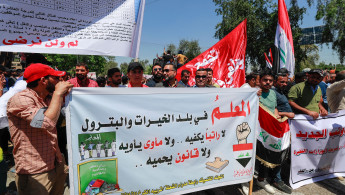Iraqi civil servants demand pay raise as government negotiates largest budget in history
Amid heavy security deployment, thousands of public sector employees took to the streets in the Iraqi capital on Wednesday, calling on the Iraqi parliament to increase their pay by including the new salary system in the ongoing negotiations on the 2023 budget bill.
Since 2008, Iraq has not amended salaries for the public sector, despite inflation rising to seven per cent in 2023, according to data by the planning ministry.
The protestors, including thousands of school teachers, entered Baghdad's fortified Green Zone, which houses government headquarters, the parliament and most foreign diplomatic missions.
Iraqi security forces arrested several protest organisers, and a senior militiaman from an Iran-backed Shia militia, Asa'ib Ahl al-Haq, in a video posted on Twitter threatened the protesters if they continue with their demands.
محاضرو وإداريو #الرصافة_الثالثة يتوجهون نحو #المنطقة_الخضراء وسط #بغداد للمطالبة بتثبيتهم على ملاكات التربية..يذكر سبق ان الحكومة ثبتت 300الف محاضر وعقد في التربية، لماذا يتهم تهميش محاضرو الرصافة الثالثة هم فقط 20الف ؟!#العراق #سلم_الرواتب #محمد_شياع #رئيس_الوزراء pic.twitter.com/Z8Eu5LnCxE
— حسن علي (@HAlmntzr) May 10, 2023
The Iraqi government has sent the country's budget bill for this year – the largest in Iraq's history, totalling US$152 billion based on US$70 per barrel of oil - to the Iraqi parliament to authorise into law.
Different political blocs inside the parliament have several notes on the budget bill, mainly questioning the allocation of large amounts for expenditures and how the Iraqi government can pay public sector employees if the prices of oil decline.
The parliament's finance committee hosted Iraq's finance minister Taif Sami on Tuesday and discussed necessary amendments to the bill before putting it on voting by the second half of this month.
Once the parliament makes the bill a law, it can be extended for the next two years without the parliament's ratification.
Iraq, the second-largest crude oil producer in OPEC after Saudi Arabia, mainly depends on income from selling oil in US dollars. The Central Bank of Iraq (ICB) then sells the US dollars, and other foreign currencies, during daily auctions.
Ninety per cent of the budget goes for consumption and paying more than six million in the public payroll, while nearly US$37 billion has been allocated for investments. The bill also includes a deficit of nearly US$48 billion.
Iraq's reserve has risen to US$115 billion this year, but the country is still one of the world's poorest countries due to the ruling political parties' rampant corruption.
Last year, the US Federal Reserve blacklisted fourteen Iraqi private banks and forced the ICB to launch an online platform to limit the flow of US dollars to countries sanctioned by the US.
To cover a large shortage in cash, the Iraqi government plans to borrow foreign debts.





 Follow the Middle East's top stories in English at The New Arab on Google News
Follow the Middle East's top stories in English at The New Arab on Google News


